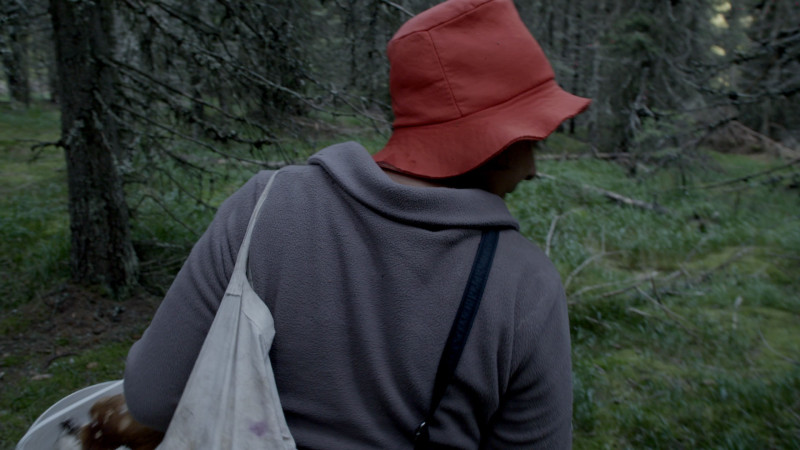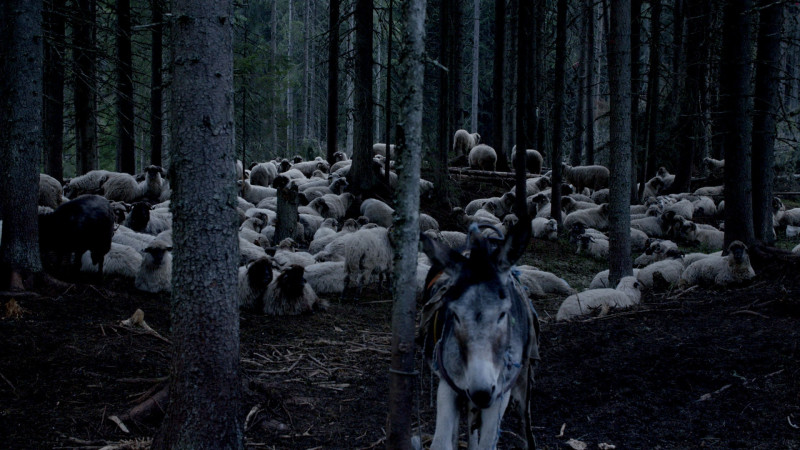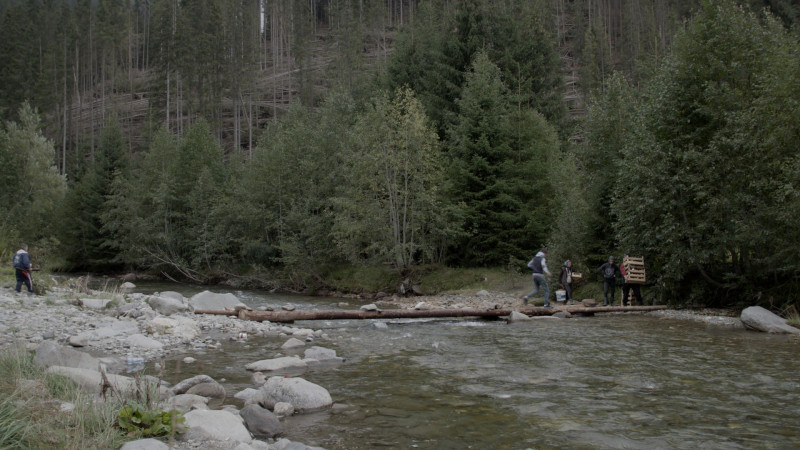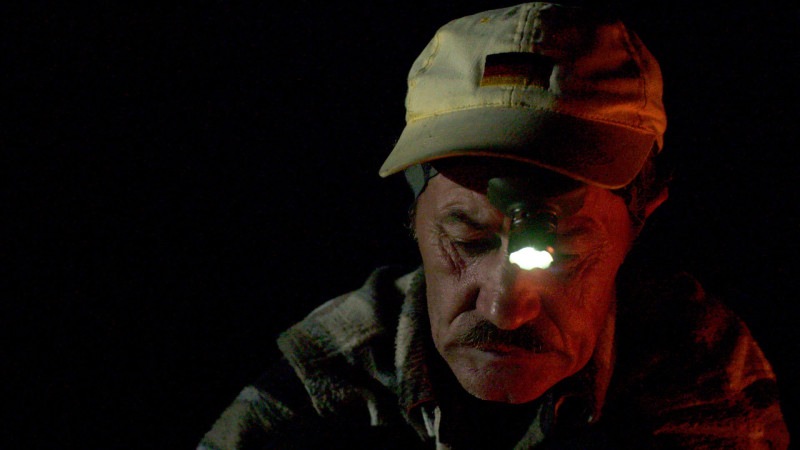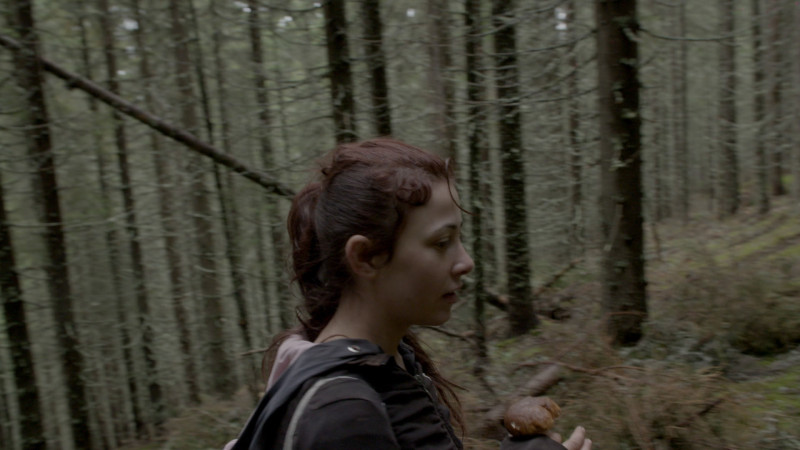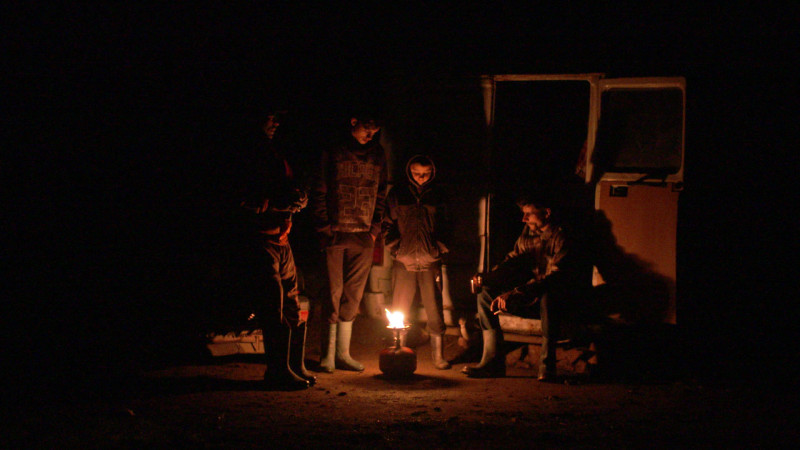Olanda
A sprawling mycelium. The starry sky over the Romanian Carpathians. The first two images introduce the dimensions that are at the core of Olanda: details and fine structures on the one hand, constellations and the bigger picture on the other. The focus is on a seasonal asset of the area - the mushroom. Amongst people it is the foragers who are nearest to them and the focus of the film is on them: on walks through the forest, in the tent camp, during car rides and conversations. From here it follows the rhizome-like ramifications that continue to branch out in the form of money: to local and international merchants, to an impromptu shoe market in a clearing, to gambling among colleagues. The film tells of these trading cycles by assuming a mushroom-like structure without ever losing its centre of thought. Beyond an analysis of economic structures, however, it is also the sensual document of a rhythm of everyday life in the forest, as experienced by foragers as the first link in the recycling chain. In the cinema, it can be experienced as an audiovisual mushroom-trip into the magical world of the Carpathian forests.
WEAVING RELATIONSHIPS
by Birgit Gombitza
In the beginning was not the word. Or the light. The narrative of human genesis in a capitalist order begins with money. With the moment when the trade of former hunters and foragers gained a new currency. One that can not be eaten, that does not warm or protect the clan from intruders. It does not help with the building of huts or the carving of game; it spices nothing, heals nothing, and, detached from everything, is useless in other planetary systems. But because it does not disintegrate as quickly, is indifferent to climatic conditions and putrefaction, passes so easily from hand to hand, only claims its equivalent value while it leaves its value dramaturgy entirely to the narratives of power, it has prevailed. With nothing but symbolism. And with this its own phenomenology it writes our story, our dreams of individual happiness and the promises of the commodity world.
In the beginning of Olanda there is darkness. A starry sky. A voice from the off, which leads us with the creaky sound of a disembodied wisdom to the beginning of everything and will continue to accompany us through that same meta-story of longing and drudgery, lack and perseverance, perpetual search and a sense of nevertheless, which is just as apodictic as it is human. We see a grotto under the earth, which will turn out to be the transition from the mushroom body to its hyphae mesh, with which the plant builds its own supply routes. Then the camp of a group of mushroom foragers, one of them looking for instant coffee with a flashlight under the canopy. A family gathering under the moon and around the camp stove. Too tired to talk, and too experienced to sulk about the work the next day will bring. A "Lord's prayer" is supposed to help to fill the plastic buckets with blueberries and porcino. In the car, moving like a firefly through the Carpathian scenery, a song on the radio tells of happiness and money, of depraved employers and how hard it is to be a father of daughters. The sky turns white and lifts its cloud cover from the foot of the mountains. We follow the mushroom foragers deep into the spruce forests in the area of Obarsia Lotrului, begin to look for porcini mushrooms and chanterelles with them, hear stalks being pushed to the side and jump at the suddenness of a branch cracking under their footsteps. In such moments, Olanda, with its magnified sound, is in the now, in the rhythm and image of a human condition, even on a treasure hunt. And no matter which of the seasonal Romanian workers the film will follow, it is not about the individualization of their narrative, but about the systemic nature of the existential situation. Those with aching backs, with baskets chaffing their shoulders and children helping them - are interchangeable. With them the gaze passes over the hammered sound rituals of the Orthodox priest in the valley, its refrain-like accompaniment by a flock of sheep, the impulse of the masses, if you will, who here does not always trust the shepherd and his dog. We meet them again when they get on average one hundred lei (equivalent to about twenty euros) at the collection points for five kilos of mushrooms, 13 lei per kilo of blueberries, when mushrooms and berries become the staple foods of cigarettes and gasoline. Until late afternoon, they roam the woods, following tips and instincts. If nobody got there before them, maybe this time it will be enough to make up what's missing. Until the middleman declares that he can not pay stable prices, because not he - as the global and popular mantra of late capitalism goes -, but the consumer at the end of the food chain determines this. During the break, they smoke, drink coffee that does not dissolve in the cold water, repair tools, charge phones with car batteries. And sometimes they show the camera cell phone pictures of particularly magnificent mushrooms, still in the damp forest floor.
"Soon they will sleep down in the valley and dream of them. Then they grow. Are neither animal nor plant, more secret than science. A genus of the third kind, they build their own kingdom. Enter alliances with trees, conveyed messages. They are drug, poison, medicine and food at the same time ", Thus the narrator sums up the mushroom mythology of her homeland out of the off. Romania dedicated its own stamp to the Fichtenstein mushroom for the first time in 1958. More than a thousand tons are supposedly consumed annually in Germany alone. Depending on the kitchen trend and heavy metal contamination. After Hiroshima, the Matsutake mushroom was the only thing that continued to grow. One of the most expensive edible mushrooms chooses to live in contaminated soils in post-industrial landscapes. The anthropologist, Anna Lowenhaupt Tsing, has, in "The Mushroom at the End of the World. On the possibility of life in capitalist ruins ", developed a much-noted allegory about economic relationships based on this phenomenon. In Olanda also, the mushroom, with its subterranean tree symbioses, down to its magic, becomes ambivalent.
And when the film title finally appears in the last third of the film, white on black, it's a little bit as if Olanda itself has looked up from below. From its mycelia in the earth to the blue glow of a dawning day. From the hidden layers of the capitalist narrative to a natural mysticism whose sublime qualities are not dispelled by the analysis of existential deficiency. It is of this that Olanda also tells, when it gazes over mountain peaks or leaves time for the soft play of light in the forest. When the natural beauty rests over the tiring steps or the morning prayers of seasonal workers. This is more universal and closer to the survival instincts of treasure hunters than the systems of religion and capital. How the film by Bernd Schoch brings all this into an interplay of interpretations and symbols, how he interlinks the atmospheric with the geo-political, the subtle with the existential, is intelligent, stubborn and impressive artistically.
At the end of Olanda the mushroom remains. And grows. As pars per toto for utilisation systems and commodity cycles. As a symbol for the installation of emergency communities, resilience and adaptation. And, thanks to Olanda's complex narrative stratification - which has much more in mind than mere critique of capitalism, and a multiple pictorial aesthetic - for an unshakeable and cinematic magic.
Documentary
154 minutes | Germany 2019
WHO
script & direction BERND SCHOCH co-author ANDRÉ SIEGERS camera SIMON QUACK sound recording OREST SKAKUN, ANDRÉ SIEGERS, MARIUS SIMINEL MÂNUNTELU production management Romania MARIA TRIFU editing BERND SCHOCH, ANDRÉ SIEGERS colors TIM LIEBE sound design & sound mix ROMAN VEHLKEN voice ILEANA MANICEA
off texts ANDRÉ SIEGERS, first text out of PETER HANDKES "Versuch über den Pilznarren: Eine Geschichte für sich", Suhrkamp 2013
translation & transcrition MARIA TRIFU additional translation OREST SKAKUN, DANA TOMOS, MARIUS SIMINEL MÂNUNTELU, SAM HEINRICHS music PETE KEMBER / SONIC BOOM, THOMAS WEBER / KAMMERFLIMMER KOLLEKTIEF subtitles ANCA BUZATU, ALEXANDER MIRIMOV, ANTJE HARBECK (SUBS Hamburg) illustration HEIKO SIEVERS title graphics STEFFEN GOLDKAMP website LASLO STRONG bestboy ZOMA DYLAN SCHOCH car support KLAUS SCHOCH
funded by FILMFÖRDERUNG HAMBURG SCHLESWIG-HOLSTEIN, DIE BEAUFTRAGTE DER BUNDESREGIERUNG FÜR KULTUR UND MEDIEN, BREMER DOKUMENTARFILM FÖRDERPREIS DES FILMBÜRO BREMEN presentation supported by GERMAN FILMS
SCREENINGS
- 69th Berlinale, Germany 2019
- dokka Karlsruhe, Germany 2019 (1st price)
- New Horizons, Poland 2019
- Slowfest, Poland 2019
- Filmfest Hamburg, Germany 2019
- Black Canvas, Mexico 2019
- Doc Buenos Aires, Argentina 2019
- Festival for Romanian Film Bremen, Germany 2019
- Nordische Filmtage Lübeck, Germany 2019
- Viennale, Austria 2019
- Cámara Lúcida, Equador 2019
- Transcinema, Perú 2019
- Duisburger Filmwoche, Germany 2019 (Arte Dokumentfilmpreis)
- Frontera Sur, Chile 2020
- UJU Mountain Film Festival, South Korea 2020
- Ujazdowski Castle Center of Contemporary Art 2020
- MIC Istmo, Mexico 2021
-
STRANDZHA
a film by
Pepa Hristova -
DER FLECK
(SKILL ISSUE)
a film by Willy Hans -
DIE STIMME DES INGENIEURS
(the engineer's voice)
a short film by André Siegers -
PAPILLON
a short film by
Francesca Bertin -
STUPOR
a short film by
Leonie Kellein -
REPRODUKTION
a film by
Katharina Pethke -
LA EMPRESA
a film by
André Siegers -
HUMAN FLOWERS OF FLESH
a film by
Helena Wittmann -
GESTERN, ICH DENKE AN MORGEN
a film by
Tom Otte -
Jedermann und ich
a film by
Katharina Pethke -
Landjaeger
a film by
Lilli Thalgott & Mignon Remé -
Drift
Helena Wittmann's
first feature -
At the bottom of the Sea
a film by
Karsten Krause & Dan Boehl -
Was wahrscheinlich passiert wäre, wäre ich nicht zu Hause geblieben
Willy Hans' recent short
which Fünferfilm co-produced -
Piqueuses
by Kate Tessa Lee
and Tom Schön -
Sec Rouge
by Kate Tessa Lee
and Tom Schön -
Arrangement of Skin
a short film
by Karsten Krause

